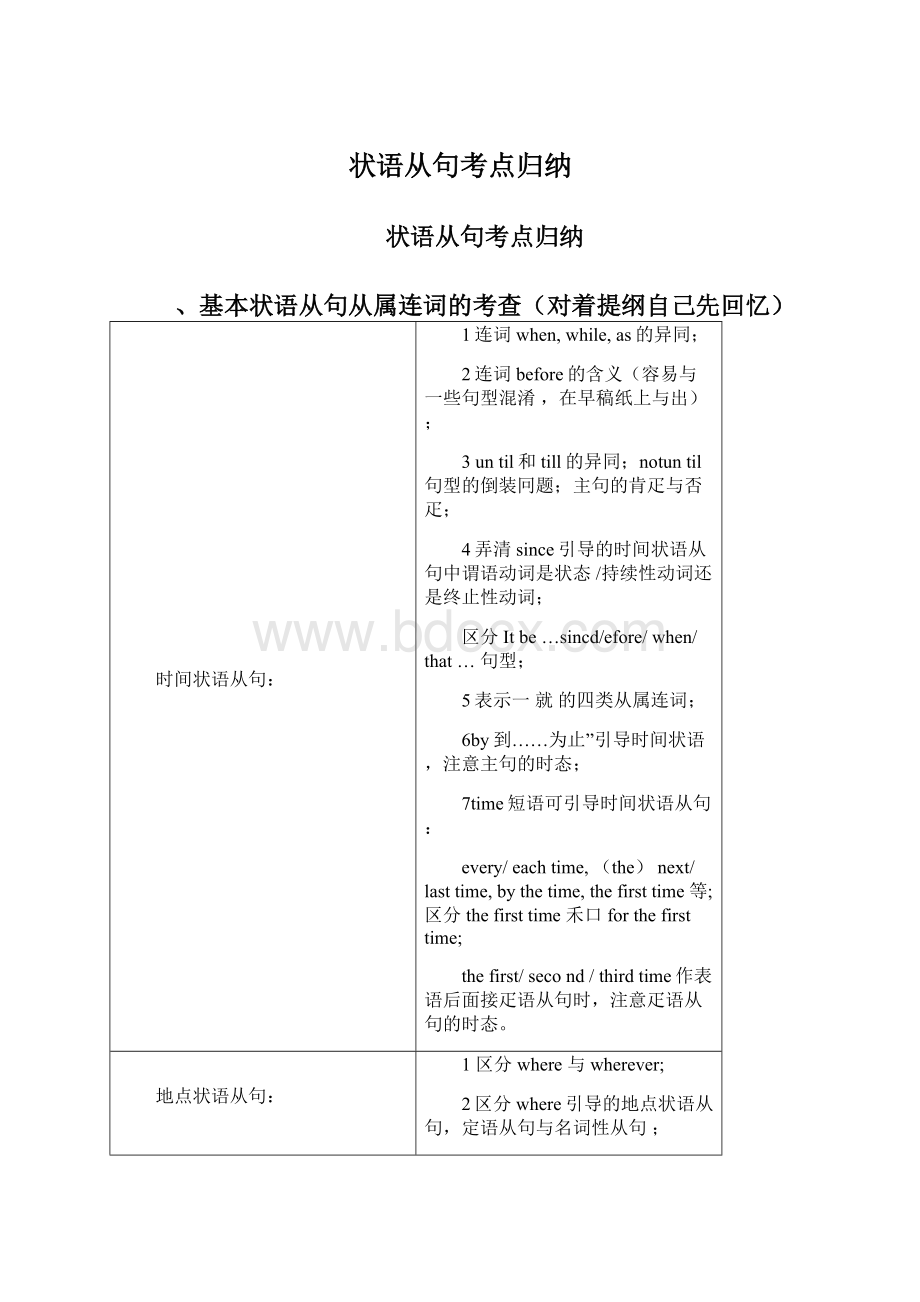状语从句考点归纳Word格式.docx
《状语从句考点归纳Word格式.docx》由会员分享,可在线阅读,更多相关《状语从句考点归纳Word格式.docx(18页珍藏版)》请在冰豆网上搜索。

2区分onlyif(只有)与ifonly(要是…就好了;
只要);
3as/solongas只要;
4其他可引导条件状语从句的词(组)★(在草稿纸上写出)
让步状语从句:
1连词although,though,as,while,when的区别;
2though/although与eventhough/evenif的区另U;
3whether…or…(不论/不管还是)
whether…ornot(不管/不论是否);
4"
疑问词+ever”与"
nomatter+疑问词”的异同;
5还有些介词短语意为“尽管”。
目的状语从句:
1inorderthat与sothat在句中的位置;
2引导词incase(免得/以防万一)与forfearthat(担心/以防万一)。
结果状语从句:
1区分so…that与such…that(口语中that可省略);
2区分结果状语从句与定语从句so/such…that与so/such…as;
3连词还有sothat,withtheresultthat。
比较状语从句:
1nomore…than(不比更)和more…than(与其说…不如说);
2as…as和notso(as)…as
3“the比较级…,the+比较级”的时态。
方式状语从句:
1as(像、如冋、按照);
justas正如、恰似;
(just)thesameas和一样;
2asitis/was;
astheyare/were按照原来/现在的样子(句末)
3AistoBwhatCistoBA对B而言正如C对D一样
4asif,asthough有时用虚拟语气,有时不用虚拟语气
5asif/asthough状语从句也可以用省略形式
二、状语从句中的省略见省略
如状语从句的主语与主句的主语一致(或从句的主语是it),且从句谓语中又包含be,则从句
主语和be动词可省Don'
ttalkwhile(youare)eating.
Helookedaroundtheroomasif(hewas)lookingforsomething.
When(hewas)askedhowhegainedfirstplace,hesuddenlybecamecheerful.
if(itis)possible女口果可能if(itis)necessary女口有必要whenever(itis)possible一有可能就
ifinneed如果有需要ifany如果有
改错Isawtheaccidentwhenwaitedforthebus.Don'
tcomeinuniessaskingto.
(现在分词或过去分词短语作定语,可以理解为是定语从句中将关系代词作的主语和be动词省略)
Doyouknowtheman(whois)sittingunderthetree.
Isthereanything(thathasbeen)plannedfortonight?
三、状语从句中时态的考查见时态
1在时间,条件状语从句中用一般现在时代替一般将来时,现在完成时代替将来完成时
when/if也可引导名词性从句该用将来时态仍用将来时态
时间状语的弓丨导词有when,while,after,before,assoonas,not…until,pnce,by
条件状语的引导词有if,unless
Idon'
tknowif/whenheillcomeback.我不知道他是否/什么时候回来。
(if,when引导宾语从句)If/whenhecomesback,I'
IItellhim.如果他回来/当他回来的时候,我会告诉他。
(if引导条件状语从句,when引导时间状语从句)
Ifyouwill(愿意)waithereforhalfanhour,Iwillletyouseehim.
Iwillgotobedassoonastheworkhasbeenfinished.
1Wewillgotothepark_tomorrow.
AifitnotrainsBifitwon'
trainCunlessitrainsDunlessitwillrain
2Whatwillyoudowhileyourparentsfortheholiday?
A.willbeawayB.areawayC.leaveD.willleave
2“The比较级…,the+比较级….结构,前面的句子相当于条件状语从句,用一般现在时代
替一般将来时Theharderyouworkatyourlessons,thelessdifficultyouwillfindthem.
3祈使句+and(then)/or/orelse/otherwise+陈述句(用一般将来时)相当于含有条件状语从句
的主从复合句。
Ifyoudon'
hurryup,youwillbelate=
Hurryup,orelse/otherwiseyou'
llbelate.=Hurryup(,)and(then)youwon'
tbelate.
祈使句有时省为名词短语_(Say)Awordmore,andwe'
lldriveyouout.
1Trythenewcleaner.Justafewminuteseveryday—that'
sailittakes—youcouldhave
shiningfloorsandfurniture.A.andB.butC.orD.so
2It'
sreallyverydangerous.Onemorestep,thebabywillfallintothewell.
A.orB.soC.andD.but
3Anotherchanee,Iwilldoitbetter.A.orB.soC.andD.but
四、状语从句中的倒装见倒装
1nosooner…than…/hardly/scarcely…when…句型中hardly/scarcely位于句首时,主句要部分倒装且常用过去完成时
2as引导让步状语从句必须用异常语序(though引导让步状语从句可用异常语序)把表语或状语提前。
句首名词不带冠词。
如实义动词有宾语和状语,随实义动词一起放在主语之前。
3so/such…that…引导的结果状语从句中,女口so/such在句首,前面用部分倒装语序。
4if虚拟句,如有had,should,were这三个词,在正式或书面语言中可将if省略,再倒装。
Ifitshouldraintomorrow,whatwouldwedo?
=Shoulditraintomorrow,whatwouldwedo?
=
Ifitweretoraintomorrow,whatwouldwedo?
=Wereittoraintomorrow,whatwouldwedo?
五、状语从句中的虚拟语气见虚拟语气
1if,ifonly引导的非真实条件句中要用虚拟语气;
2asif,asthough引导的方式状语从句中如表达的是一种事实不符的情况要用虚拟语气。
六、容易误认为状语从句的结构
1myhometowntakeonanewlook,asenseofsuddenlyappearedinmymind.
3
Allhertimeexperiments,shehasnotimeforfilms.
4alargeamountoftimedevotedtolisteningeveryday,manystudentsdonotlisten
effectively.A.BecauseofB.InsteadofC.DespiteD.Though
基本状语从句从属连词的考查
一、时间状语从句
1连词when,while,as的异同
1)当…时候,引导的时间从句中的动词可是延续性动词(可用as/while)也可是非延续性动词(可用as)
When/While/Aswewerehaving(延续性动词)aparty,thelightwentoff/out.
Whenthelightwentoff/out(非延续性动词),wewerehavingaparty只用when或after引导这个从句,不用as或while。
when
Whenthelightwentoff/out(非延
当从句的动作发生于主句动作之前,
When/Afteryouhavefinishedyourwork,youmayhavearest.
正要做某事突然/这时
正要做某事突然/这时正要/正在做某事突然/这时在去某地的途中这时
刚刚做了某事这时
一就
2)when充当并列连词的句型
be(just)abouttodosth.when
beonthepointofdoingsth.when
bedoingsth.when
beonthewaytosp.when
hadjustdonesth.when
hardly/scarcely/rarelyen/-befolre
3)when不表示时间而表示原因或让步的用法
女口果/考虑至U(同consideringthat/if)Howcanhegetgoodgradeswhenhewon'
tstudy?
既然(同since)Whydidyouwritewithapencilwhenyouknowyoushouldwriteinink虽然/尽管Sheusuallywalkswhenshemightride.
while
导的时间状语从句中的动词必须是延续性的
2)表对照,引导并列句MotherisbusydoingthehouseworkwhileFatheriswatchingTV.
3)(书面语)虽然/尽管…(但同时)…,引导让步状语从句
WhileIadmitthatthereareproblems,Idon'
tagreethattheycannotbesolved.
Whilethegrandparentslovethechildren,theyarestrictwiththem.
as
1)在…期间,当…的时候一一
1as引导的时间从句中的动词可是延续性动词,可用while或when,但as侧重从句的
动作和主句的动作同时发生,一边…一边…"
IreadtheletterasIwalkedalongtheriver.
时间从句中的动词也可是非延续性动词,可用when,但as侧重两个短促动作几乎同时
发生JustasIcamein,aboyrushedout.
2表"
随时间推移,随着"
,不用when或while。
Asthedaywenton,theweathergotworse.
3as+名词=when从句Asayoungman(=Whenhewasayoungman),he…
2)因为①表示理由比较明显,只是附带说明一下由于”常用于口语中)
②as从句通常在前.AsJaneistheoldest,shelookedaftertheotherchildren.
3)尽管,即使,纵然
连词as(多用于书面语,从句在前)也可以引导让步状语从句,但从句中要用特殊语序,必须表语或状语提前(形容词、副词、分词、实义动词提前)。
(though也有这种用法,可替换as,但although不可倒装)
Youngas/thoughheis,heknowsalot=Though/Althoughheisyoung,heknowsalot
Childas/thoughheis,heknowsalot=Though/Althoughheisachild,heknowsalot
Tryhardashewill,heneverseemsabletodotheworksatisfactorily.
4)和…一样、像、如同、按照,引导的方式状语从句通常位于主句后
DoinRomeastheRomansdo.WemuststudyasZhouEnlaidid.
Youshoulddoastheteachertellsyouto.
5)…也是这样,相当于2连词before的含义(容易与一些句型混淆)
1)在…之前/还没来得及…/不等….就HewentoutbeforeIhad(had)achancetotellhimthenews.
2)(没多久)就;
(用不了多久)就Wehadn'
twaitedlongbeforethebuscame.
Itwasnotlongbefore…没多久就
Itwon'
tbelongbefore…用不了多久就
3)(以后)才Itwas/took…before…过了…才…
Itwillbe/willtake…before要过…才…
Ittooksixyearsbeforetheygotmarried.Itwillbealongtimebeforetheygetmarried.
4)宁愿…也不…Hewilldieofhungerbeforehewillsteal.他宁愿饿死也不愿行窃
notuntil句型的倒装问题;
主句的肯定与否定
1)till和until意思相同,但下面三种情况用until:
1在句首
2在强调句型“Itisnotuntilthat直到'
•f才…)中
3在Notuntil•句型中
注意:
notuntil在句首,句子/主句倒装;
notuntil用在强调句中,句子/主句不倒装
2)主句的谓语如果是延续性动词,主句要用肯定式,意为直到……为止”
主句的谓语如果是非延续性动词,主句要用否定式,意为直到……才……”.
Iwillwaituntilhereturns.Iwon'
leaveuntilhereturns.
4弄清since引导的时间状语从句中谓语动词是状态/持续性动词还是终止性动词
区分Itbe…since/efore/when/that…句型
Itis(=hasbeen)/was+时间+sinee•从已多久了
Itis/hasbeenthreeyearssinceImethiminBeijing.
ItwasalongtimesineeIhadlivedinthatsmallmountainvillagewiththesefarmers.注意时态
ItisfivemonthssineeIarrivedinNewYork.我到纽约已经五个月了。
ItisfivemonthssineeIwasinNewYork.我离开纽约已经五个月了。
终止性动词表示从动作发生时算起;
状态动词或持续性动词,则从动作或状态结束时算起。
5表示一……就……”的四类从属连词:
assoonas句子可以表示将来
assoonas;
themoment/minute/second/instant;
immediately/directly/instantly;
nosooner…than•,…hardly/scarcely/rarely…when/before….
Ihadhardly/scarcelygothomewhenitbegantorain.
Ihadnosoonergothomethanitbegantorain.AssoonasIgothome,itbegantorain.
如果hardly/scarcely/rarely或nosooner置于句首,句子必须用倒装结构:
Hardly/Scarcely/RarelyhadIgothomewhenitbegantorain.
NosoonerhadIgothomethanitbegantorain.
hardly/scarcely/rarely…when/before,nosooner…than前面常用过去完成时,
后面用一般过去时。
6by到……为止”引导时间状语,句子用完成时态
BytheendofnextJulytheworkwillhavebefinished.Bynowwehavelearned12units.
bythetime到…的时候"
引导时间状语从句,从句中用一般现在时代替一般将来时,
现在完成时代替将来完成时,主句用完成时态
Bythetimeyoug£
i_here,theworkwillhavebeenfinished.
Bythetimehewasfourteen,hehadlearnedmathsallbyhimself.
7time短语可弓丨导时间状语从句:
every/eachtime,(the)next/lasttime,bythetime,anytime等;
thefirsttime(第一次…的时候,连词,弓I导时间状语从句)
forthefirsttime(第一次,作状语)
ThefirsttimeIwentabroad,Icouldhardlyunderstandwhattheforeignerssaid.
WhenIwentabroadforthefirsttime,Icouldhardlyunderstandwhattheforeignerssaid.
thefirsttime还可作表语,后面接定语从句,一般用完成时态。
This|s]thefirsttimethatyouhbvebeenlate.ItwaslthefirsttimethatyouHadbeenlate.
二、地点状语从句
1区分where与wherever
where(在的地方),wherever(无论/不管在哪里)(后者表强调,且地点是不确定的)
Where引导的地点状语从句可以换成in/at/totheplace+where引导的定语从句。
(见定从)
WhereIlivethereareplentyoftrees.我住的地方树很多。
WhereverIamIwillbethinkingofyou.不管我在哪里我都会想到你。
三、原因状语从句
1连词because,since,as,for的区另U
because1)表主句和从句间有着必然的因果关系因为”
2)通常主句在前从句在后,但强调原因时则相反IdiditbecauseIlikedit.
3)回答why问句;
引导表语从句;
强调结构”Itis/was…that中•厂”"
nobecause••butbecause…"
结构中
在partly/mainly/only/just后只能用because
as1)表示理由比较明显,只是附带说明一下由于”(常用于口语中)
2)as从句通常在前.AsJaneistheoldest,shelookedaftertheotherchildren.since1)表示显然或已知的理由既然”
2)从句通常在前.Sinceyou